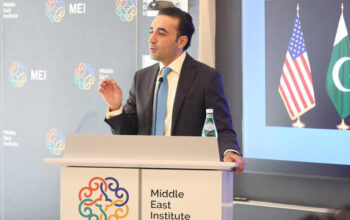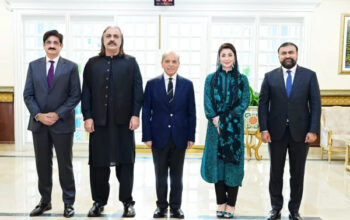By Staff Reporter
ISLAMABAD: Pakistan is under pressure from the International Monetary Fund (IMF) to include agriculture income tax in provincial budgets by September 2025 and ditch a federal plan to boost power consumption, local media reported on Thursday.
The IMF’s push comes as the country’s four provinces have already overspent their next fiscal year’s development budgets by nearly Rs850 billion, Dawn newspaper reported.
The Fund is now insisting on a firm commitment from provincial governments to rein in expenditures, despite expansionary development plans greenlit by the National Economic Council. Yet, the provinces face a tough road ahead: they may struggle to deliver a promised budget surplus this year due to a revenue shortfall at the federal level.
In response, provincial authorities are pushing to maximize their allocations for the upcoming year, aiming to lock in financial rights guaranteed under the National Finance Commission before its next meeting.
A major sticking point in the negotiations is the IMF’s call for full implementation of agriculture income tax and related services, a policy that remains mired in disagreement between the federal government and the provinces.
The Centre contends that corporate agriculture falls under its jurisdiction, complicating efforts to settle the issue. The Fund, however, is unwavering, viewing the tax as critical to broadening Pakistan’s revenue base and ensuring effective collection starting no later than September 2025.
The government’s proposal to incentivise increased power consumption has also sparked a sharp rebuke from the IMF. Authorities had sought a waiver to sell 7,000 megawatts of surplus power capacity at marginal cost, without subsidies, arguing it could jumpstart economic activity by channeling affordable energy to new consumer and industrial sectors at breakeven rates.
But the IMF isn’t buying it. Dawn reported the Fund sees this as a distortion reminiscent of past policies, like tax breaks, incentives, and allowances, that have dragged Pakistan’s economy into its current straits.
The IMF argues that offering cheap power to new users would unfairly burden existing consumers already grappling with steep electricity prices. It also warns of competitive imbalances, with older industries saddled with higher input costs forced to vie against new setups fueled by discounted energy. Instead, the Fund has urged the government to renew cost-cutting measures to stabilise the power sector and level the playing field for all players.
Adding to the uncertainty, a segment of the government is angling to allocate 2,000 megawatts of electricity to crypto farming at a steeply discounted rate of 3-4 cents per unit (Rs8-9 per unit), well below the base rate of Rs24-25 per unit. Whether this plan will gain traction remains unclear.
The IMF is also taking aim at provincial subsidies on electricity and gas, such as those rolled out by Punjab this year, with plans to repeat them next year. The Fund has made it clear it wants these subsidies scrapped and is pushing for coordinated federal-provincial strategies to tackle electricity and gas theft, as well as smuggling, to plug financial leaks and stem tax losses. On top of that, provinces are being told to streamline their departments next year, mirroring a right-sizing effort the federal government is undertaking this year.
On the revenue front, the Federal Board of Revenue (FBR) is holding firm to a tax collection target of roughly Rs14.2 trillion for the next fiscal year, a figure cemented during the first review of the IMF’s extended fund program a few months back. Most other economic estimates from that review are expected to stand pat. The budget will offer a modest breather for the salaried class with slight tax rate relief, but the FBR is sharpening its focus on squeezing more revenue from the retail sector.
The government plans to roll out differential tax and transaction rates for cash versus digital payments, aiming to nudge businesses and consumers toward a more digital economy.
Copyright © 2021 Independent Pakistan | All rights reserved




